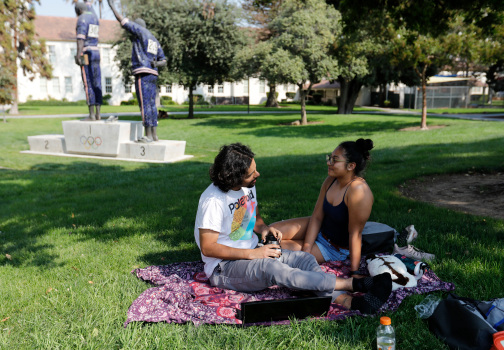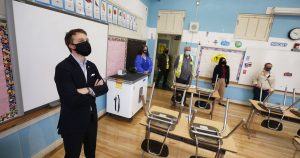California State University will not require employees and students at its 23 campuses, including CSU East Bay and San Jose State, to be vaccinated against COVID-19 this fall.
Its decision comes as a small but growing number of colleges and universities are announcing plans to mandate vaccines to restore a sense of pre-pandemic normalcy this fall – but face political and legal challenges.
Other Bay Area campuses – including Stanford, Santa Clara and University of California at Berkeley and Santa Cruz – are considering their options and have not yet announced their plans. While UC Davis doesn’t mandate vaccines, it is now offering shots to anyone age 16 or older, including out-of-towners, a week ahead of the state’s timeline.
But CSU campuses may require specific populations of students, such as athletes and dorm residents, to be vaccinated, added spokesman Michael Uhlenkamp. These policies would vary from campus to campus.
With falling case counts and expanded access to the vaccines, colleges and universities plan much more in-person instruction in the fall, hoping to create a sense of security, conviviality and collaboration in higher education.
But universities face a unique challenge as they begin to open up. Students need to socialize, join study groups, take field trips and engage in other group activities. And housing may be dense, with students living in dorms where infection rates are much higher than in single family homes.
There’s a risk to the community, because college students are mobile and can spread COVID-19 whenever they travel. Yet their own risk of severe illness is low, with few deaths in a population that ranges in age from 18 to 26 years old.
Because the vaccines are currently being offered only under the U.S. Food and Drug Administration’s Emergency Use Authorization, and don’t have formal approval, CSU worried about its legal liability, said CSU’s Uhlenkamp.
“Upon advice from the CSU Office of General Counsel, and in extensive consultation with counsel at other institutions of higher education throughout the country, the CSU has determined that it is not able to require all employees and students to receive a COVID-19 vaccine as a condition of maintaining employment or enrollment,” he said.
So far, at least 14 U.S. campuses have decided to require students to be vaccinated before enrollment this fall.
Most of them are private, with many students living on campus, such as Brown University in Rhode Island and Cornell University in New York, both Ivy League schools.
Other major private schools that will require vaccines this fall are New York’s Ithaca College, Syracuse University and Manhattanville College; University of Notre Dame in Indiana, and Northeastern University in Boston.
But two public schools — with “open” campuses, like CSU — also have taken the step: New Jersey’s Rutgers University and Colorado’s Fort Lewis College.
Many more colleges are only recommending vaccines. The American College Health Association is urging all college students to be immunized before the end of the spring term to prevent them from spreading the virus as they disperse over the summer.
The American Council on Education says that a school’s COVID-19 vaccine mandate should be drafted to align with existing state statutes and regulations, including legal exemptions. The organization said it seems likely that such a mandate would be upheld, according to its issue brief. The federal government expects workplaces to be safe, it added.
“I think we’re going to see legal challenges, but my sense is that this issue is very quickly becoming far less a legal issue or even a science and data and facts issue — and it’s becoming a political issue,” said Peter McDonough, the organization’s vice president and general counsel.
“Colleges and universities embrace science and data and facts, and there seems little doubt… that the science and the data overwhelmingly support the fact that COVID vaccines are the best and quickest way out of the pandemic and the best promise of bringing students and their campuses back to something approaching normal,” he said.
To encourage vaccinations, schools may consider alternatives, such as offering vaccine incentives like free sports tickets or denying some activities to unvaccinated students, according to the Council. In some instances, schools could require that unvaccinated students study online, not in person.
But schools in states like California and New York, where state laws support a university’s decision to require various vaccinations as a condition of showing up on campus, are more likely to require vaccination.
At Stanford, “we are in the process of evaluating whether we will have COVID-19 vaccination requirements for any on-campus populations once vaccines are fully and easily available to all. No final decisions have been made at this time,” said spokesperson E.J. Miranda.
Santa Clara University spokesperson Deborah Lohse said that “discussions are ongoing.” Its March email to staff and faculty stated that vaccination was not required, but strongly encouraged.
Although the University of California does not currently require COVID-19 vaccination, recommendations for next fall are still in development, according to spokesperson Michael Crawford.
“The university takes its responsibility for student and community health seriously and various policy options will be revisited as the pandemic continues and as new information becomes available,” he said. “The pandemic remains an ongoing threat to individual and community health.”



















